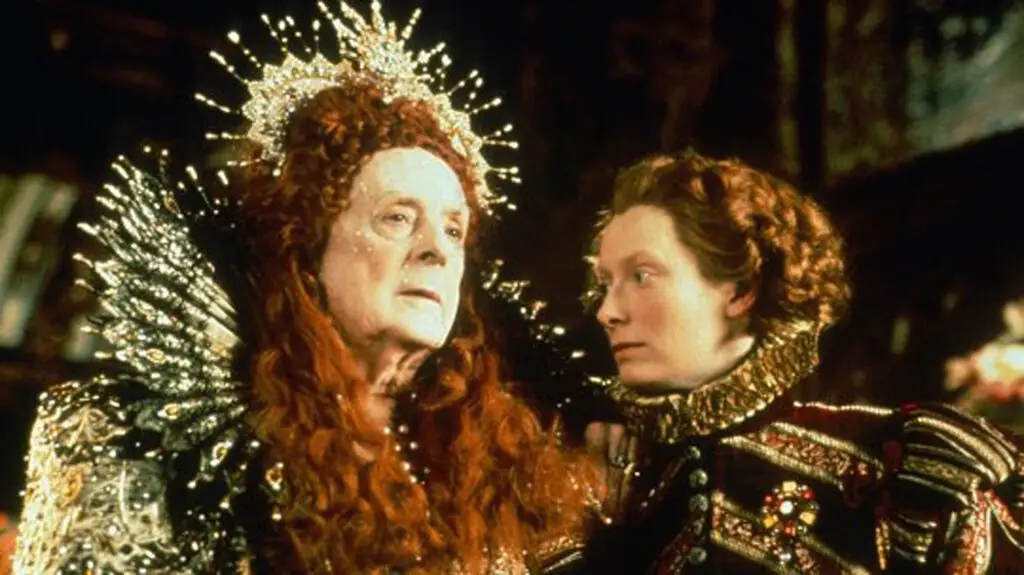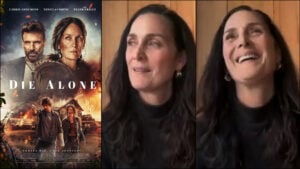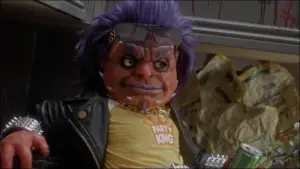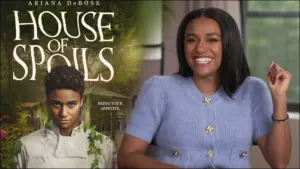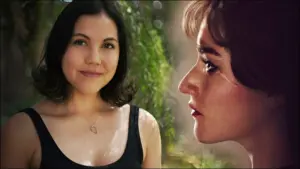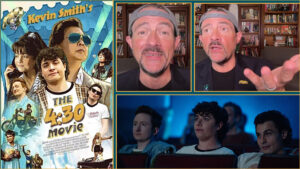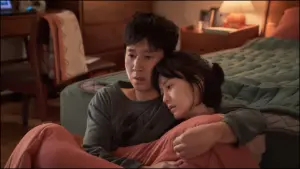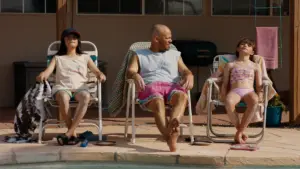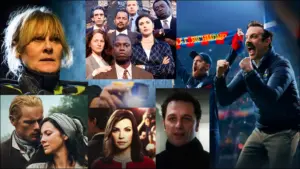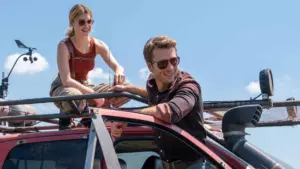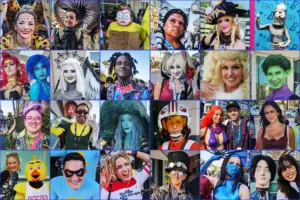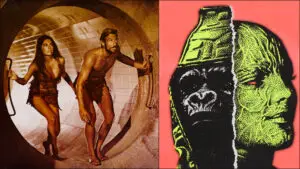In 1993, I got the chance to interview a writer-performer named Quentin Crisp. I didn’t know who he was, but when I heard that not only was he was appearing as Queen Elizabeth I in an adaptation of the Virginia Woolf novel Orlando (a novel I’d enjoyed in an English class), but that he also frequently wrote as a film critic, I thought “Why not?” The phone interview went smoothly and was a lot of fun, with Crisp being particularly polite and easy to talk to. Crisp died in 1999 at the age of 90. In 2022, the film Orlando (released and well-regarded in 1992, though not reaching the wider public till 1993) was the subject of 30-year retrospectives, both as a great subversive film and also an early showcase for the excellent actress Tilda Swinton. This interview takes a look at a time when The Crying Game was the talk of the town and Reservoir Dogs (discussed in the interview) was a relatively obscure and unknown movie.
Straight Talk With Quentin Crisp: August 4, 1993
“There could be no doubt about his sex.” Then again, he is rather convincing as Queen Elizabeth I. Quentin crisp is a hot property right now, receiving rave reviews for his portrayal of Queen Elizabeth I in Orlando, a film by Sally Potter. Potter’s Orando is based on Virginia Woolf’s novel about a journey through time by someone who lives for 400 years, first as a man, then as a woman. Crisp portrays Queen Elizabeth I as she nears the end of her days and becomes so beguiled by the handsome young Orlando that she pledges him the Crown deeds to his ancestral home.
“I could never be a real actor because I’ve no idea why people do the things that they do,” notes Crisp. “So I can’t think what Queen Elizabeth’s view of herself and her kingdom really are and I don’t ahve any opinions as to how she should be. I simply step into costume, and I say the lines and follow the instructions. As Mr. Tracy [Spencer Tracy] said of movie acting, ‘Toe the mark and say the words.’ That’s all I really can do.’
Now 84 years old, author and actor Crisp has previously appeared in just two stage plays, as Lady Bracknell in The Importance of Being Earnest, and in Lord Alfred’s Lover, both by Oscar Wilde; and in just one previoius film, Franc Roddam’s The Bride (1985) opposite Sting. He also performed a one-man show all around the world.
Born in Surrey, England, Crisp lived in Epsom with his family until 1931 when he moved to London. He later fulfilled his ambition to move to New Yrok, securing his status there as a resident alien in 1980, and has remained ever since. Best known for his autobiography, The Naked Civil Servant (later dramatized for television with John Hurt in the lead role), Crisp is the author of 10 books and continues to write and review films regularly for the New York Native and Christopher Street magazines. Recently, local film critic Zachary Woodruff, had the opportunity to speak with Crisp.
Zachary Woodruff: How did you get started doing movie reviews?
Quentin Crisp: I think my agent asked Mr. Steele [Thomas Steele], who runs the magazine Christopher Street, if I might do reviews, and finally Mr. Steele consented. For a long time I went every month to a movie with Mr. Steele and afterwards we would discuss the movie and talk about what to write. And that’s that.
What kind of movies do you enjoy?
The kind of movies I like are movies with plots. I don’t like movies about whether I love you more than you love me. I find that very tiresome, just as one does in real life. Police movies and private eye movies are the movies that I like. They have to have some action. I don’t mind whether everybody gets killed or not, so as there’s something to think about.
Did you see The Crying Game?
I saw The Crying Game secretly, and along with the synopsis that you get in a secret showing, there was a letter going “Shhh!,” and we were not allowed to reveal the terrible secret. It’s difficult to review a movie without giving things away.
What did you think of the secret?
Once you know the secret, you run the whole movie back through your head. It seems unlikely, to put in mildly, that anyone would invite someone to call on his girlfriend if he knew that it was not a woman. In that situation, you would do anything to have that secret not discovered. It’s so improbable. There was another man who seemed jealous of the other woman (the transgender woman). That is nonsense. Nobody is jealous of the life of a drag queen. However, I was never bored during the movie.
Do you still review movies?
I now review movies whenever Mr. Steele is available. He now works very hard running four different magazines. So I don’t do it as much.
Why do you need Mr. Steele with you in order to review a movie?
If I went by myself, I’d have to pay, and I don’t like to do that. In earlier times in England, a theater seat cost nine pence. Now I believe it’s seven dollars.
Have you seen Orlando?
I saw a secret showing of Orlando when I went to the Museum of Modern Art in New York. I never dreamed it would be shown to real people. I regarded it as unabashed festival material.
What do you think is the message behind the story’s gender-bending?
I don’t think it’s a film with a message. I think it’s a vast pageant. And it’s very good as that. The art direction is quite remarkable because each century has its own color constancy. One critic said it might have been better as a book of photographs. And, in a way, it is a book of photographs.
What were your feelings about getting the chance to play a literal queen after spending your life as a figurative one?
Well, I had, of course, no feelings about it at all. I do as I’m told. I’m a born slave. And Ms. Potter (Sally Potter, the director) came to New York, I hope not only to see me, but to see me among other people, and I went to meet her and I read a few lines from the script. She said, “Will you do it?” and I said, “I want what you want.”
I’ve heard you say that before. Why do you have an “I want what you want” attitude?
It’s my nature. I have never tried to assert my will over anything or anybody. If you do that, then you’re responsible for what happens. But if you never do that, then you’re never to blame. When I was a child, all I wanted to be was a chronic invalid. And now I have an agent, which is exactly the same thing. Whenever people ask me in the street, “Hello, how are you?,” I say, “You’ll have to ask my agent.”
Are you still doing your stage show?
I gave up doing the one-man show. I think I’ve said it all now. Now I’m just trying to behave nicely.
How are you doing that?
I’m rushing from pillar to post being interviewed and saying the usual things in the usual way. When I go home, I’ll have a day’s work in a movie that I’ll call experimental, made by students in a dim cellar. In Manhattan, every flat surface is a stage.
What are some of your favorite current films?
I haven’t seen many wonderful current films. Reservoir Dogs is a very exciting movie. It’s slightly amoral because, as you know, they catch a policeman and they tie him to a chair and carve his face. Ten minutes later, he is shot, which means that the plot has not been advanced one inch by the torture scene. It’s only there to assuage the American public’s lust for violence against the police force, and that’s a sin. Otherwise, I enjoyed it.
I also liked Bad Lieutenant. That also features Mr. [Harvey] Keitel who has become very, very good. Well, it was a bit mawkish in the end when you-know-who came off the cross and stood in the middle of a church. I think the intent was to be as shocking as possible. Each movie has to go further than the last so they’ve all gotten much worse.
What do you think of the way homosexuals are represented in movies?
I don’t really understand what all the fuss is about. I once was at a party when Kiss of the Spider Woman was mentioned. I took a deep breath, and was about to act out the whole movie, when a man said, “Don’t see it.” And I said, “What makes you say that?” And he said, “It’s a typical straight person’s view of a Gay person.” And I said, “What’s that got to do with it?” If he [William Hurt’s character] had been the modern homosexual, he’d have said, “Take the damn message yourself.” It’s only because Mr. Hurt thought he was Sonia Braga that made him take the message. Without it, there is no plot. What the world thinks of the image has nothing to do with it. What matters is the movie.
Do you think you have succeeded in opening others’ minds to homosexuality?
Well, I never really had that as a mission, of course. I was trying to survive at any cost.
You have said that it’s easier to survive in America than it is England. Why do you think that is?
In America, at least in big cities, you don’t have any problem because, in America, everybody is your friend. In England, nobody is your friend. I think it’s the English temperament. The English are island people. They haven’t been bothered with outside influence since that unpleasantness with the Normans. They treasure their indignation and it makes them very hard to get along with. When I was last there, I was giving a talk and the audience asked me if I noticed any change in England’s attitude toward homosexuals. I said, “You’re getting better.” And they applauded. Then I added, “You’re becoming more American.” And they laughed uneasily.
Do you have any guiding principles that have helped you to better survive?
Not really. I just had to live through it, which I did. The one thing you must never do is defend yourself. If you do, you’ll be killed because you’re never attacked in the street by just one person.
But hasn’t that changed? Shouldn’t people defend themselves?
I do think times have changed. But it was the only way to deal with it that I knew.
How do you feel about all the show biz attention you’re getting now?
Well, of course, Americans are mad about show business so that the moment you’ve been on stage, even for 10 minutes, they feel they should talk to you and get your autograph and question you. And that’s fine with me. I’m willing to be questioned forever and ever. Whenever I go back to New York, I allow a little waylaying time in case anyone stops me and wants to talk to me. I enjoy it. You see, people are my only pastime so that the more people I’m with, the better I like it. If I have an ambition, it’s to meet everybody in the world before I die. And I’m not doing badly.
Aren’t your books and other endeavors meaningful to you?
No. I write the books they tell me to write. When I hand in my typescript, I say, “Are these the words you wish to print?” When I’m on stage, I say, “Are these the words you wish to hear?”
What do you think caused you to become famous without ambition?
I think people think that my life was more deliberate than it was. Actually for instance, it was very hard for me to find work in England and I did whatever came to hand. I wrote books, did drawings for commercial purposes. I taught tap dancing. I newver had any talent for any of these things, but what else could I do?
Do you think it’s easier to make it in America?
In Amerca, you don’t have to work. You can give up tomorrow. You can go into the smiling and nodding business. I’m in that business and I’m here doing it at the moment.
What is one thing you’ve learne din your life that you’d like to pass on to others?
If you want a message to your readers, tell them they don’t have to win. Everyone thinks they have to succeed, and worse, they think they have to be better than other people. It’s a mistake to compare yourself to other people. What matters is not what the world thinks of you, but what you think about yourself.

